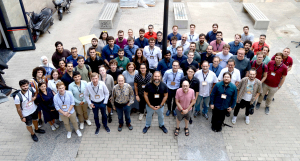IFIC organizes an international workshop on the use of Machine Learning in experiment design
The Institute for Corpuscular Physics (IFIC), a joint center of the Spanish National Research Council (CSIC) and the University of Valencia, organized the Fourth MODE Workshop on Differentiable Programming for Experiment Design from September 23 to 25. This international workshop focused on the application of Machine Learning in various areas of physics, including particle physics, nuclear physics, astroparticles, computing, and medical physics.
The event was co-organized by several principal investigators from major experimental projects at IFIC, thereby linking the workshop’s research themes with key areas such as LHC physics, nuclear physics, neutrino studies, and medical physics. In addition to these fields, the workshop also covered topics in computational science and muon tomography, highlighting the cross-disciplinary nature of Machine Learning across different research domains.
This workshop is part of the MODE project (Machine-learning Optimized Design of Experiments), an interdisciplinary collaboration between physicists and computer scientists aiming to apply differentiable programming to optimize detector design for experiments in particle physics. The project's goals range from fundamental research in accelerators, nuclear physics, and neutrinos, to industrial applications that utilize radiation detection technologies.
The event featured international participation, including scientists from Europe, the Americas, and the Asia-Pacific region. Keynote speakers included international leaders such as Danilo Rezende (DeepMind), Andrea Walther (Humboldt University of Berlin), and Riccardo Zecchina (Bocconi University), who delivered lectures on the latest advances in artificial intelligence applied to physics research.
The workshop underscored the growing importance of artificial intelligence in advancing physics and other technological fields. Applications discussed ranged from the design of medical instruments for cancer treatment to innovations in cargo transport security using muography and the optimization of infrastructure. These technologies are poised to have an exponential impact in the future, reinforcing the role of Machine Learning in the development of both science and industry. The workshop also explored the implications of Machine Learning in Theoretical Physics.
The Local Organizing Committee included IFIC researchers Roberto Ruiz de Austri (chair), José Salt Cariols (co-chair), César Domingo, Emma Torró, Gabriela Llosá, Miguel Villaplana, and Michel Sorel.



















